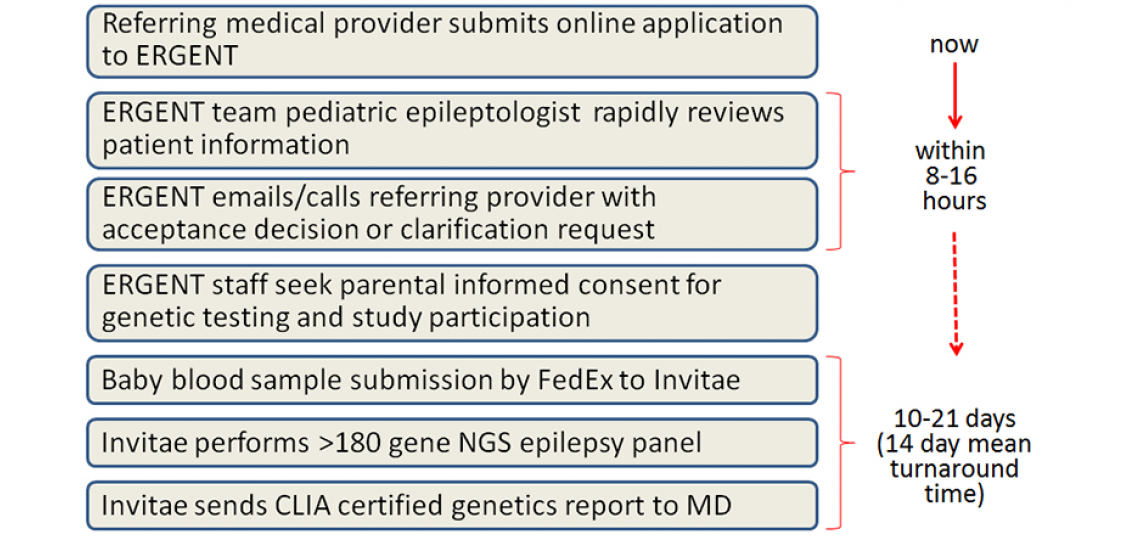What is ERGENT?
ERGENT is a study being conducted by a multi-institutional research team to learn how to better diagnose babies with seizures very soon after birth, so treatment may be targeted to the specific cause.
Seizures in babies can be the result of a birth injury, but in about 5-10 percent of instances, they are caused by a specific genetic change. Research has allowed doctors to learn features that are common in babies with genetic epilepsy. ERGENT provides comprehensive free-of-charge genetic testing for qualified babies experiencing seizures.
Who can apply for free genetic testing for newborn patients or children with seizures?
Application is very easy, but only a treating medical provider can apply. We will notify the applying doctor (or neonatal nurse practitioner) if their patient meets study criteria very quickly, at the latest, within 8-16 hours.
ERGENT Timeline

Applications for Study Now Available
The online application is brief (2-5 minutes). An acceptance decision is returned quickly, typically within 1-2 hours, always within 8-16 hours.
Parents, researchers work to find cause of neonatal epilepsy
ERGENT seeks to increase awareness of neonatal genetic epilepsy, test new tools for identifying the newborns at highest risk for this condition.
Keep Up With the Latest
Study updates keep referring physicians abreast of developments.
Notice
ERGENT has been reviewed and approved by the interdisciplinary human subjects research committee (IRB) at Baylor College of Medicine
Study Co-Investigators

Baylor College of Medicine, Houston, Texas, United States

Lurie Children’s Hospital, Chicago, Ill., United States

Children’s National Medical Center, Washington DC, United States
ERGENT Sponsors
This research is supported by The Jack Pribaz Foundation, KCNQ2 Cure Alliance, and FamilieSCN2A Foundation. These foundations were formed by parents of children affected by early-onset genetic epilepsy. The funders want to shorten the time families often wait before obtaining a specific genetic diagnosis, and encourage future development of new targeted treatments. Invitae is providing reduced cost testing and results reporting to ERGENT as a collaboration with the research team, family groups, and study participants. Baylor College of Medicine’s Department of Neurology has supported the planning and development of ERGENT.
Disclosures
Edward C. Cooper is a consultant to Knopp Biosciences and Xenon Pharmaceuticals, which are interested in developing products related to early onset genetic epilepsy. The terms of these arrangements have been reviewed and approved by Baylor College of Medicine in accordance with its policy on Financial Conflicts of Interest in Research. John J. Millichap has conflict of interest to declare. Tammy Tsuchida has no conflicts of interest to declare.
Applications for Study Now Available
The online application is brief (2-5 minutes). An acceptance decision is returned quickly, typically within 1-2 hours, always within 8-16 hours.
Notice
ERGENT has been reviewed and approved by the interdisciplinary human subjects research committee (IRB) at Baylor College of Medicine.









